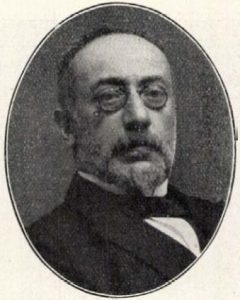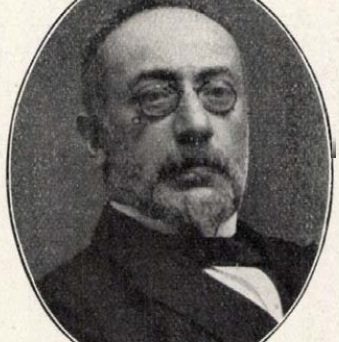Zsigmond Kornfeld, Baron
Zsigmond Kornfeld (Goltsch-Jenikau, Czech Republic, 27 March 1852 - Budapest, 24 March 1909) was a banker, the CEO of the Hungarian General Credit Bank and the second president of the Budapest Commodity and Stock Exchange.
His life
Youth
His father was a tenant of a small distillery. Sigismund was a rabbi, but after his father went blind and died in the mid-1860s, he was forced to interrupt his studies at the grammar school. Weakly built, Sigismund had to work from the age of 14.
Professional activity
Business activity
He first got a job in the bank houses of M. Thorsch's sons and Wahrmann and Son in Prague. He was a so-called "handyman", working 10-12 hours a day. He was sent to Vienna and Paris at the age of 20. In 1871, he was in besieged Paris at the time of the Commune. On his return, he was employed by the Böhmischer Bankverein and shortly afterwards became deputy manager of the Prague branch of Credit-Anstalt. In December 1877, in Vienna, he met Albert Rotschild, who asked him to send him to Budapest as an instructor at the Hungarian General Credit Bank. On 13 March 1878 he took up his post as a member of the board of directors.
The means for the occupation of Bosnia-Herzegovina in July 1878 were provided by the banks with Rotschild interests. In this connection, Zsigmond Kornfeld made several trips to Paris.
As the director of the first Hungarian financial institution, the Hungarian General Credit Bank, he was responsible for the personal representation of the bank and its actual management, although he was not the formal head of the bank, but Major Count Ede Pallavicini. He was given the opportunity to become independent in 1894, when the contract between the Magyar Általános Hitelbank and Credit-Anstalt was renewed instead of renewed.
He was a prominent figure in the financial life of his time. He was involved in the founding of many important companies, such as the Hungarian River and Shipping Company and the Fiume Oil Refinery Company, of which he became chairman. He was also involved in the establishment of the Budapest Brokerage and Minting Company, which was set up to facilitate and secure the circulation of movable capital, and was a director of the former. He was also a director of Ganz Electricity Co., the Budapest branch of Credit Anstalt, Ganz-Danubius Co. and Beočini Cement Works Co.
In 1890, he bought the Rakovica estate (Trenčín county), where he built a synagogue for the Israelites living there, exercising a kind of canonical right. He managed the estate using modern methods.
President of the Budapest Commodity and Stock Exchange
He was a member of the Board of the Budapest Commodity and Stock Exchange from 1891, and its Chairman from 1899 to 1909. It was during his presidency that the new headquarters of the Exchange was built on Szabadság Square, which served as its headquarters until 1948.
Public activities
- In 1890 III. class. He was awarded the Order of the Iron Crown.
- In 1893 he received the II. class. Order of the Iron Crown in 1893.
- In 1896, he was a member of the Board of Representatives of the Jewish Community of Pest, then a magistrate, and later vice-president.
- In 1902, he was appointed a member of the House of Lords.
- On 22 February 1909, he received the title of Baron from King Franz Joseph of Hungary.
Sources
- József Bokor (ed.). The big lexicon of Pallas. Arcanum: FolioNET (1893-1897, 1998.). ISBN 963 85923 2 X
- Hungarian encyclopedia XI (Kir-Lem). Editor-in-Chief Lászlóné Bárány. Budapest: Hungarian Encyclopedia. 2000. p. 348. ISBN 963-9257-04-4
- Károly Halmos: Zsigmond Kornfeld. In: Diverse capitalism. Ed. Marcel Sebők. Published by. HVG Publishing Ltd. pages 154-165.
Source: wikipedia

Born: 27.03.1852
Place of birth: Goltsch-Jenikau
Date of death: 24.03.1909.
Place of death: Budapest
Occupation: banker
Parents:
Spouses: Borbála Frankfurter
Children: György, Mária, Móric, Pál, Ferenc
Author: by Radnai Márton
Zsigmond Kornfeld, Baron
Zsigmond Kornfeld (Goltsch-Jenikau, Czech Republic, 27 March 1852 - Budapest, 24 March 1909) was a banker, the CEO of the Hungarian General Credit Bank and the second president of the Budapest Commodity and Stock Exchange.
His life
Youth
His father was a tenant of a small distillery. Sigismund was a rabbi, but after his father went blind and died in the mid-1860s, he was forced to interrupt his studies at the grammar school. Weakly built, Sigismund had to work from the age of 14.
Professional activity
Business activity
He first got a job in the bank houses of M. Thorsch's sons and Wahrmann and Son in Prague. He was a so-called "handyman", working 10-12 hours a day. He was sent to Vienna and Paris at the age of 20. In 1871, he was in besieged Paris at the time of the Commune. On his return, he was employed by the Böhmischer Bankverein and shortly afterwards became deputy manager of the Prague branch of Credit-Anstalt. In December 1877, in Vienna, he met Albert Rotschild, who asked him to send him to Budapest as an instructor at the Hungarian General Credit Bank. On 13 March 1878 he took up his post as a member of the board of directors.
The means for the occupation of Bosnia-Herzegovina in July 1878 were provided by the banks with Rotschild interests. In this connection, Zsigmond Kornfeld made several trips to Paris.
As the director of the first Hungarian financial institution, the Hungarian General Credit Bank, he was responsible for the personal representation of the bank and its actual management, although he was not the formal head of the bank, but Major Count Ede Pallavicini. He was given the opportunity to become independent in 1894, when the contract between the Magyar Általános Hitelbank and Credit-Anstalt was renewed instead of renewed.
He was a prominent figure in the financial life of his time. He was involved in the founding of many important companies, such as the Hungarian River and Shipping Company and the Fiume Oil Refinery Company, of which he became chairman. He was also involved in the establishment of the Budapest Brokerage and Minting Company, which was set up to facilitate and secure the circulation of movable capital, and was a director of the former. He was also a director of Ganz Electricity Co., the Budapest branch of Credit Anstalt, Ganz-Danubius Co. and Beočini Cement Works Co.
In 1890, he bought the Rakovica estate (Trenčín county), where he built a synagogue for the Israelites living there, exercising a kind of canonical right. He managed the estate using modern methods.
President of the Budapest Commodity and Stock Exchange
He was a member of the Board of the Budapest Commodity and Stock Exchange from 1891, and its Chairman from 1899 to 1909. It was during his presidency that the new headquarters of the Exchange was built on Szabadság Square, which served as its headquarters until 1948.
Public activities
- In 1890 III. class. He was awarded the Order of the Iron Crown.
- In 1893 he received the II. class. Order of the Iron Crown in 1893.
- In 1896, he was a member of the Board of Representatives of the Jewish Community of Pest, then a magistrate, and later vice-president.
- In 1902, he was appointed a member of the House of Lords.
- On 22 February 1909, he received the title of Baron from King Franz Joseph of Hungary.
Sources
- József Bokor (ed.). The big lexicon of Pallas. Arcanum: FolioNET (1893-1897, 1998.). ISBN 963 85923 2 X
- Hungarian encyclopedia XI (Kir-Lem). Editor-in-Chief Lászlóné Bárány. Budapest: Hungarian Encyclopedia. 2000. p. 348. ISBN 963-9257-04-4
- Károly Halmos: Zsigmond Kornfeld. In: Diverse capitalism. Ed. Marcel Sebők. Published by. HVG Publishing Ltd. pages 154-165.
Source: wikipedia
